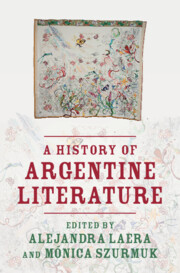Book contents
- A History of Argentine Literature
- A History of Argentine Literature
- Copyright page
- Contents
- Figures
- Contributors
- Editors’ Acknowledgments
- Introduction
- Part I Literary Dates
- Chapter 1 1536: The Creation of a Literary Space
- Chapter 2 1810: Patriotic Voices
- Chapter 3 1837: The Foundation of a National Literature
- Chapter 4 1884: A Literary Field in Formation
- Chapter 5 1910: A Modern Lettered City
- Chapter 6 1926: Traditions Old and New
- Chapter 7 1948: Culture and the State
- Chapter 8 1963: Experimentation and the Common Reader
- Chapter 9 1980: Memory and the Novel
- Chapter 10 2001: Argentine Narrative in the New Millennium
- Part II Critical Inroads
- Part III Literary Names
- Index
- References
Chapter 2 - 1810: Patriotic Voices
from Part I - Literary Dates
Published online by Cambridge University Press: 09 May 2024
- A History of Argentine Literature
- A History of Argentine Literature
- Copyright page
- Contents
- Figures
- Contributors
- Editors’ Acknowledgments
- Introduction
- Part I Literary Dates
- Chapter 1 1536: The Creation of a Literary Space
- Chapter 2 1810: Patriotic Voices
- Chapter 3 1837: The Foundation of a National Literature
- Chapter 4 1884: A Literary Field in Formation
- Chapter 5 1910: A Modern Lettered City
- Chapter 6 1926: Traditions Old and New
- Chapter 7 1948: Culture and the State
- Chapter 8 1963: Experimentation and the Common Reader
- Chapter 9 1980: Memory and the Novel
- Chapter 10 2001: Argentine Narrative in the New Millennium
- Part II Critical Inroads
- Part III Literary Names
- Index
- References
Summary
This chapter analyses the impact of the 1810 Revolution and its aftermath in the making of Argentine literature. Political affairs fueled the circulation of locally produced printed matter. Patriot leaders engaged in writing, and memoirs, letters, speeches, proclamations, and newspaper articles soon became part of a new arena of public debates. This new print culture was also aimed at reaching lower-class audiences, crucial for the victory of the patriotic endeavor. Texts were often read aloud for those who were illiterate – the overwhelming majority of the population– and even published in translation in Indigenous languages. Thus, the Revolution generated a zone of encounter between the literate classes and the oral culture of plebeian sectors. This zone of encounter, together with the revalorization of the gauchos, gave birth to a surprising cultural expression called gauchesque poetry, the first literary genre of a distinctive local flavor. A rather peculiar type of literature, it was a written genre imitating the oral style of rural inhabitants. The plebeian voice thus acquired a central location in the nascent local letters, thus destabilizing the boundaries between social classes and their cultures. This transgression would have a lasting impact on Argentine literature.
- Type
- Chapter
- Information
- A History of Argentine Literature , pp. 24 - 38Publisher: Cambridge University PressPrint publication year: 2024



